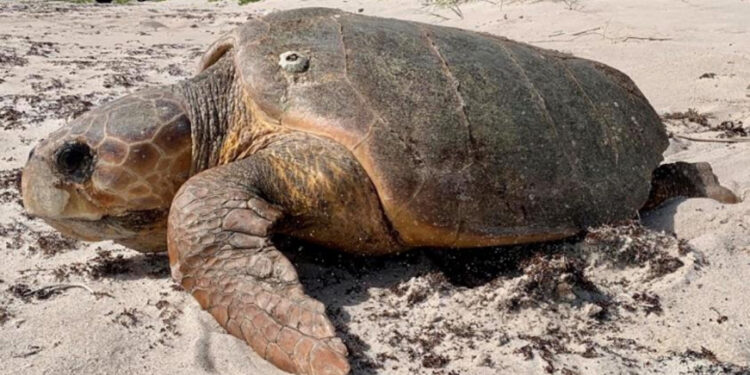The 2023 nesting season is turning out to be better than expected in Indian River County (IRC). During the 2022 nesting season, loggerhead sea turtles, listed as threatened by the State & Federal governments, set a new nesting record in the county with 7,431 nests laid.
Because individual sea turtles typically return to their nesting beach every other year or every third year, it was expected that the 2023 season would be an “OK” year. However, this past week loggerhead sea turtles blew past the 2022 record with over 7,600 nests laid to date. Loggerhead sea turtles start nesting regularly each year in April. So, we can expect their nesting numbers to continue to increase until the end of the 2023 nesting season on October 31st.
As of July 20, 2023, the nest counts within the county are:
- 7,664 loggerhead nests
- 2,296 green turtle nests
- 27 leatherback nests
*preliminary data, the nesting season is still on-going
The green sea turtle, also listed as endangered by the State & Federal governments, set their nesting record in the 2017 season with 2,634 nests laid within IRC. The 2019 season came close to that record with 2,378 nests. Green sea turtles typically start nesting in late May and continue through October.
Leatherback turtles are also endangered and usually lay more nests in the counties south of IRC. But they set a new record for our county with 101 nests last year. On average, over 16 years, we get about 55 nests each year.
This year is the 50th anniversary of the Endangered Species Act (ESA) of 1973. This law helps protect sea turtles in the United States. Two parts of the U.S. Government, the U.S. Fish and Wildlife Service, and the National Marine Fishers Service, are in charge of carrying out the ESA for sea turtles. They work together to decide which animals are threatened or endangered. Because it takes a sea turtle 25 to 35 years to become an adult, two new generations of turtles have likely helped increase the number of nests since turtles got protection 50 years ago.
Important Sea Turtle Protection Topics
- Sea turtle nesting season begins on March 1 and runs through October 31 each year. This is the same time local nighttime lighting ordinances are in effect.
- Artificial light, like outdoor landscape lights, can deter adult turtles from laying a nest and potentially confuse hatchlings, causing them to crawl in the wrong direction away from the ocean.
- All species of sea turtles are protected. Only those with valid permits issued by the Florida Fish and Wildlife Conservation Commission (FWC) can handle sea turtles.
- If someone sees a sick, injured, or dead sea turtle, please report it to the FWC Wildlife Hotline at 1-888-404-3922.
- If beachgoers come across healthy adult sea turtles on the beach, keep a distance of 50 feet or more away. The presence of a person can scare the turtle into returning to the ocean before laying a nest.
- Beachgoers should remove furniture from the beach after each day, take garbage with them, fill in holes, and knock down sand castles. If you visit the beach, please leave it clean, flat, and dark.
Cool Facts About Sea Turtles
Three distinct species of sea turtles generally nest within Indian River County. Each turtle can lay up to six nests during one season, with each nest containing 80-120 eggs.
Sea turtles are unique species to protect when compared to other species that are afforded protection under the ESA. These marine reptiles leave feeding grounds to migrate thousands of miles through international waters returning to the same sandy beaches they hatched from to
lay their eggs. It can take one turtle between 20-30 years before its mature enough to lay eggs. It’s estimated that 1 out of 1,000 hatchlings will reach adulthood.
Indian River County maintains a comprehensive Habitat Conservation Plan for the protection and monitoring of nesting sea turtles along the County’s coastline. This county-wide effort began in 2005.
For more information on the County’s Sea Turtle Conservation Program, please contact Quintin Bergman, Indian River County’s Sea Turtle Environmental Specialist, or check out their data dashboard.







